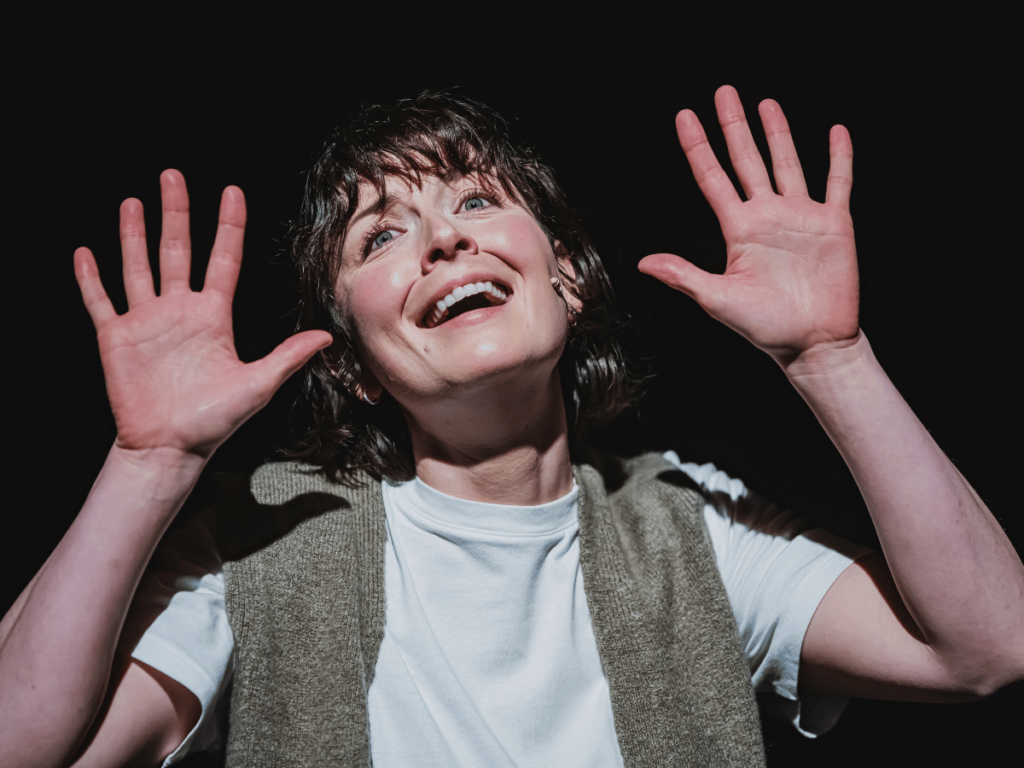Marine Furet reviews Ie Ie Ie, a new production from Theatr Genedlaethol Cymru.
Trigger warning for discussion of sexual assault/rape.
‘Ie Ie Ie’: an exclamation, a scream of acquiescence or pleasure. Despite the enthusiastic, even visceral promise of its title, this new production from Theatr Genedlaethol is less of an exploration and more of a collective discussion about consent and sexual education, directed by Juliette Manon.
Performed by Eleri Morgan, Ie Ie Ie gets to the heart of consent – how we know it, give it, and receive it. The public reckoning with the omnipresence of sexual violence has led to various attempts at portraying its impact on stage and television. TV productions such as I May Destroy You and Sex Education offer up some of the best recent examples of stories that delve into the consequences of sexual assault on an individual level. In their portrayal of characters reeling from experiences of rape and sexual assault, and their seeking out of resolution and community, these narratives invited us to feel and empathise with the characters as they stumbled their way to healing and safety.
Instead of an in-depth immersion, Ie Ie Ie seems to envisage theatre as a kind of therapeutic act – safe, controlled, and facilitative. But where Ie Ie Ie fulfils its function as a didactic workshop, it loses its pace as a play.
The performance has a broadly regular structure, alternating between different mediums. The overarching story is Eleri’s first-person narration of a positive hook-up, which contrasts with the story of a sexual assault told by texts read out loud by members of the audience. There are also video interviews of young people talking about their experience of sexuality, often with quite a lot of seasoned wisdom, and pauses for the audience to insert their thoughts via a poll displayed on stage – often in this order. This composite process is repeated several times over the course of the performance. The shift from one modality to the other ultimately lends the performance a surprising lack of emotional depth: the characters are not so much three-dimensional, flesh and blood as they are archetypal – particularly when we shift to the story told by way of texts.
The most memorable moments often focused on Eleri Morgan’s own reflection on her own experience, in a narrative that feels lively, honest, and never erring on the side of voyeurism. Her self-awareness about her position, particularly reflecting on the way to engage with someone after an assault, sticks out as a truthful moment, giving her stage persona a more grounded appeal. Morgan, who plays her own part, shows herself to be a warm, empathetic performer, encouraging audience participation and gently checking in. I also appreciated the show’s effort at showing a diversity of experiences and its gender-neutral approach. The soundtrack is punctuated by some well-loved local artists including Eädyth Crawford and Adwaith.
Born of engagement workshops around Wales, the play is going to be touring in schools and the performance therefore has to tread the waters between a show and a classroom-safe experience. This is a delicate balancing act, particularly as the right to discuss sexuality at school has come under vicious attack while the creative sector, too, is suffering a financial blow that will probably cause lasting damage.
Ie Ie Ie ultimately leaves little to be experienced or intuited, so intent is it on explaining, unpacking and breaking down its topic to an audience of pupil-spectators. When audience texts came in the night I attended, they often praised the show for its discussion of the theme of consent, but since when has the sole purpose of artistic performance become thematic debate? As with recent demands that art be relatable as a measure of its quality, it felt hard to engage with a show whose sole logical end is for us to agree with it.
All articles published on the welsh agenda are subject to IWA’s disclaimer. If you want to support our work tackling Wales’ key challenges, consider becoming a member.




